I haven’t taken my coat off and Vanessa has already introduced me to Cath, a freelance employment advisor.
“What do you do at the UCAN?” I ask her as a mug of tea is pushed into my hand.
“Whatever people need to do with employment and training,” she says. “If we hear that ten people are looking to get a store job in the run-up to Christmas then I’ll put on a little course on applying for retail jobs. That sort of thing.”
This UCAN prides itself on its responsive approach. Why offer apples when people want oranges, I had been told. There’s no point delivering services that no one needs.
Today is day three of a four-day course Cath is running to boost self-esteem and motivation. Before she can explain the ins and outs we’re interrupted by a knock on the door. The centre isn’t officially open for another 15 minutes.
“Can I use the phone?” asks a middle-aged man. “Vanessa said I could come early. I need to call them about my tax credits and make sure they’ve got my new address.”
Cath lets the man in and as soon as she sits down again there’s another knock on the door. It seems we’re not going to manage even the briefest of conversations. “I’ll pop up to your course later,” I say, “if that’s okay.”
Today it’s going to be busy. It’s money day and both Dawn from Money Skills and Steve from the Hoot credit union are in. And so is Jade from Think Positive, an ‘emotional wellbeing’ service. Vanessa introduces me to them all as the UCAN Centre starts to fill up with customers.
I’m feeling a little overwhelmed by it all and I take my tape recorder and camera and take refuge in Cath’s course in the upstairs meeting room.
Two men and four women are sitting round a table strewn with sweets and biscuits. Cath is asking about their perceptions of the Jobcentre. “You say it’s depressing as soon as you walk in, but what, specifically do they do to you?
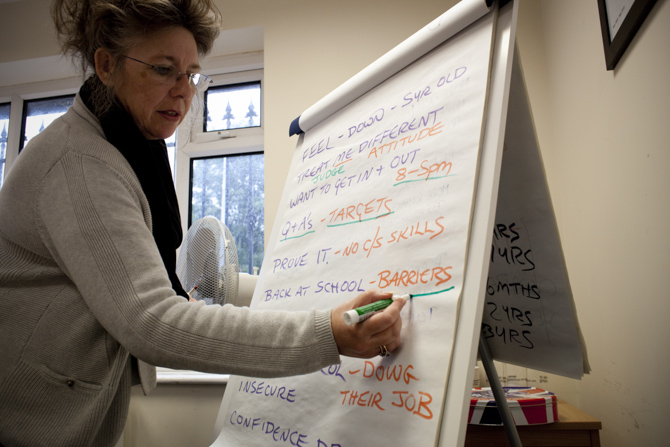
She is bombarded with negatives about people’s Jobcentre experiences and, pulling the top off a marker pen, has trouble writing them on her flip chart fast enough. “It’s horrible, I hate it… They ask you lots of questions: What jobs have you been looking for? Can you prove it?… It makes you feel like you’re back at school… You feel belittled…”
“As soon as you walk in that door your confidence just goes,” says one of the women. “You feel insecure.”
“You feel insecure, Morag? Isn’t it amazing how powerful this Jobcentre is? Look what it does to us,” says Cath, looking up from the flip chart.
“So let’s put ourselves in their shoes. We’re a Jobcentre advisor now. Do you think everyone walking towards their desk will have a gorgeous smile on their face?”
The participants, having enjoyed sharing what they hate about the JobCentre, are a little taken aback at having to see the situation from the other side. Everyone’s quiet as they try to imagine the scenario from the opposite angle. Cath suggests that the advisors will have targets and be under pressure to meet those targets.
“They still don’t have to talk to people the way they do,” says Morag. “They could talk to people nicely.”
“They must be like us though,” says a woman in a red top. “They must have good days and bad days.”
“What happens, do you think, when they leave the Jobcentre at the end of the day?” asks Cath.
“They forget about us,” says Morag.
“How do you know that?”
“I don’t. But that’s what I would do. I wouldn’t want to go home with my work.”
“But they’re not put in a cupboard to be recharged for the next day, are they?”
“They probably have pressures of their own,” says the woman in red, as the penny starts to drop.
“They are human beings like we are and they’ll have the same pressures: our bills, our debts, kids in trouble. Just because they are Jobcentre advisors doesn’t mean they’re not living every day like we are. And then they’ve got the likes of Mr Cameron telling them they’ve each got to get, say, 120 people into a job this month.”
“When there aren’t any,” someone says.
“When there aren’t any,” repeats Cath. “So, do you think they feel pressure? Of course they do. Even before they open the door to you guys.”
“And then we knock on the door,” laughs one of the men.
“Do you think they feel insecure? Is there a chance on it?” continues Cath. “With all that they have going on, do you think there’s a chance some of them might feel insecure?”
There are reluctant nods from around the room.
“So, what do you think would help your next visit to the Jobcentre? What could you do?”
“Smile,” someone says quietly as if breaking ranks.
“Walk towards them smiling,” repeats Cath.
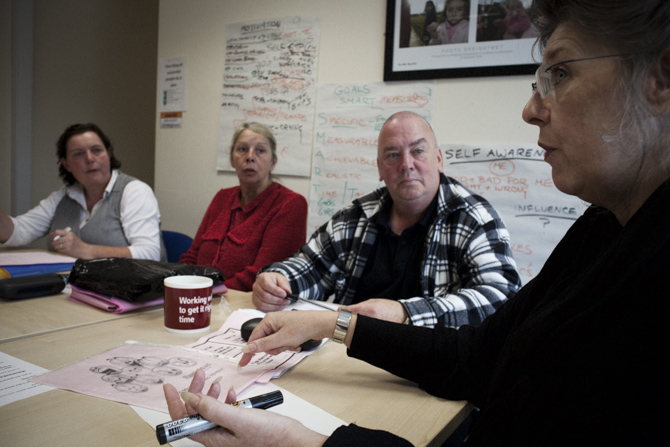
Ten minutes ago it would have been like throwing a hand grenade into the room if someone had suggested smiling at a JobCentre advisor but Cath has got them there – most of them anyway – and now the group realise that it’s their own attitude that affects the outcome of their Jobcentre experience.
“Won’t it get me into trouble though?” asks Morag.
“When was the last time anyone was imprisoned for smiling?” suggests Cath, with a big grin. “If you understand a bit more about them and have more self awareness about yourself then you can actually help to change their approach towards you.
“It’s about making it a win-win situation for you. And please don’t think the Jobcentre advisors are out to get you. They’re not. Change that perception. They have their limitations like we all do.
“And don’t expect them to do everything for you, because they can’t. Remember the UCAN has got experts to help you with a CV… we want you to have the best.”
It’s two weeks later and I am walking with Morag through the town centre to one of Bolton’s two Jobcentres. A report on the radio this morning suggested there are nearly as many new store openings on UK high streets as there are closures. Bookmakers, charity shops and pawnbrokers top the list of new openings.
“When did you last have a job?” I ask as we negotiate a busy crossing.
“Because of my health I haven’t worked for 27 years,” says Morag, “except for a few weeks as a classroom assistant. I’ve been on Incapacity Benefit. But now I’ve been put on Jobseeker’s Allowance. I came yesterday to sign on and this morning I’m seeing my advisor. I have to show I’ve been looking for work.”
“What happens if you can’t show you’ve been looking?”
“They can sanction you. They can take some of your money from you.”
We reach a nondescript two-storey building opposite a bingo and casino complex. It must only recently have become a Jobcentre because the only signs yet up are those declaring the building is protected by G4S.
“Cath said I have to go in with a positive attitude. I’m supposed to smile… to say it’s been nice weather. The woman will look at me as if I’m mad.”
Morag says she’ll be ten minutes but it’s nearer half and hour before she is out on the pavement again.
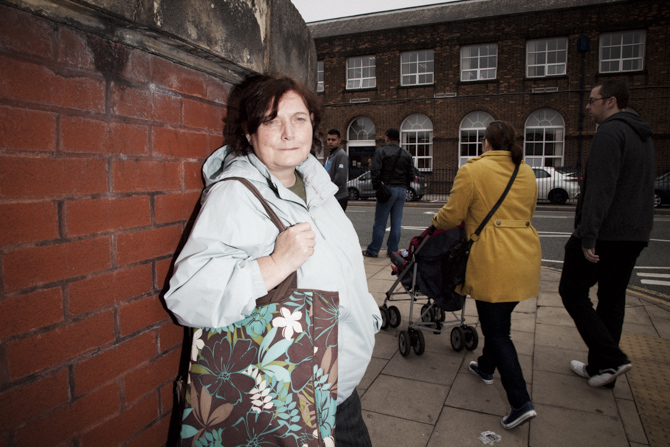
“So what did you say to her?”
“I said, Good Morning!” she says in a high-pitched, cheery voice. “But she just said, Yeah.”
“And what did you talk about?”
“She went through my CV but wasn’t very happy. She said there was no point saying I wanted to be a classroom assistant on a CV that I was sending in for a retail job. I have to do more specific ones for particular types of jobs.”
“That makes sense. Do you know how to do that?”
“There’s someone at the UCAN job club who will help me. He’s really good with CVs.
“And then there’s a thing called Universal…” Morag thinks for a second, “… Universal Jobmatch. You have to register online and they give you a number. And you have to keep logging in with that number and going through all the jobs. That way they can see if you are actually looking for work.
“She said for next week I definitely have to be on it, otherwise she could dock money off me. She might say I haven’t earned my money one week and that will be it. You have to toe the line.”
“And how much do you get each week on Jobseeker’s Allowance?”
“£71.70.”
“£71.70? And how much do you have to live off after bills and that?”
“£15 a week before I’ve bought any food. They’ve taken £160 a month off me.”
“We should sit down and have a longer chat,” I suggest.
… continued from Hardworking people
Kellyann has to pick up Jackson from nursery soon and I ask to tag along so I can take some pictures of her. “When I’m not at uni or working, I like to go and collect him. And it gives Paul a break.”
As we walk up the road opposite the UCAN, Kellyann tells me about their move across town from Farnworth, where she grew up. “We had a one-bedroomed flat on a bad street,” she says, “there were dealers and drug addicts banging on our windows the whole time. We asked to be moved but it took us three years – and loads of support from local councillors, the police and solicitors – before they offered us something else.”
“And was moving here to Breightmet your choice?”
“To be perfectly honest with you, it was the only house they offered us. I had no family up here but Paul used to work nearby and said it was fine. It honestly didn’t bother me. I’d heard it was rough, but at the end of the day they were offering us a house. And I love it up here now.”
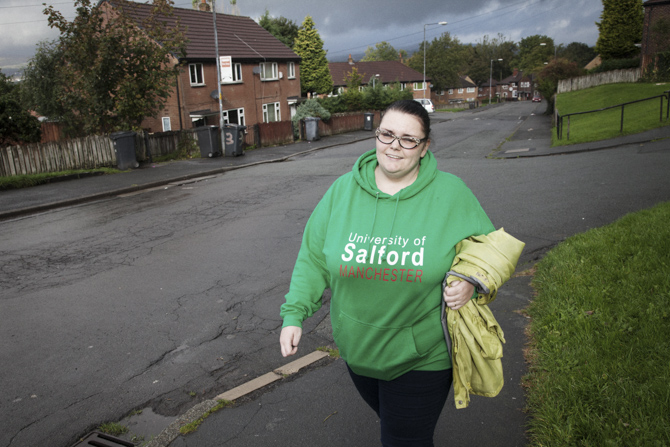
“What was your first reaction when you saw the house? You must have been over the moon?”
“The lady who had lived there before us had just died and I remember opening the side gate and all the funeral wreaths were still up the path. I was mortified, absolutely mortified: it was the dead lady’s house….Oh, it’s weird being photographed, just walking along.”
“People will think you’re famous!”
“They promised they’d do a lot of work on the house, but it’s never been done. My bedroom has never been decorated. They promised they’d re-skim the walls after some electric problem, but never have. But am I bothered? I’ve got a house, it’s warm and I’ve got good neighbours. I’m quite happy. My kids are happy. All that will come.”
We’re early and so we sit on the pub wall opposite the primary school.
“Tell me about the UCAN. How did that all start?”
“I got dragged in! I wasn’t very well. I was suffering with postnatal depression after I’d had Jackson. It wasn’t an easy birth. And one of my friends was coming to the knitting group and she literally grabbed me by the hand and dragged me in.
“They were all laughing at my hair! It was pink and purple at the time.”
“There’s a lot of pink and purple hair in Breightmet,” I say. And there is.
“I started it,” she laughs.
The ‘naughty knitters’ group got Kellyann through the uPVC front door, nearly three years ago. Since then she’s been on pretty much everything the UCAN has to offer. She now runs the group. Most recently Vanessa has helped her with the bursary application.
“The bursary is means-tested,” she explains. “So I had to get a letter from the Jobcentre to confirm my tax credits. It took them ages. At first Vanessa was emailing twice a week, then ringing every day. It took eight weeks to write that letter.”
“Which is why your bursary is late and you’re still having to work?” I ask.
Kellyann nods.
The school gate is opened and we walk round to the classroom entrance. “What would you have done, if the UCAN hadn’t been here?”
“I’d be stuck. I’d have still been ill for a start. I know it was only knitting but it got me back out talking to people and it gave me something to look forward to. I started to go out – I’d had agoraphobia – and I started talking to the mums at the school gate. I came off my medication, finished my therapy, started and finished an access course with brilliant marks, then got one of 60 places at uni from over 1,800 applicants.”
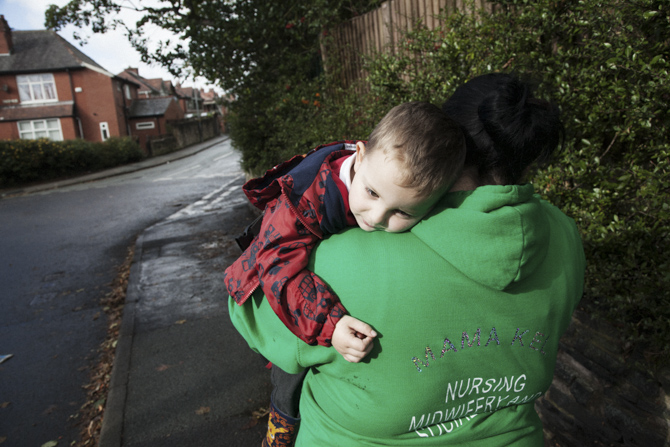
“Would you put starting your university degree down to walking into the UCAN?”
“Absolutely,” she says as a three-year-old is reunited with his mother and is immediately handed a chocolate egg. “UCAN fired the starting pistol for me.”
Jackson is delighted to see his mum and unfazed by the stranger with her. “Can we go to the shop?” he asks, glancing at his classmate unwrapping the egg.
“Not today mate.”
In his tiny kitchen Lee is putting away the contents of two plastic bags. This is all he will eat for the next week, until he can make another visit to the food bank.
It’s mostly tins: oxtail soup, kidney beans, sweetcorn, ravioli, baked beans, tuna. There’s a couple of packets of biscuits and some out-of-date trifle sponge fingers; a box of chocolate-flavoured breakfast cereal, a litre of orange juice and a packet of pasta.
Fresh items are limited to whatever has been donated to the food bank that week so Lee unpacks of a packet of trimmed runner beans, three sunflower-seeded wholemeal rolls, and a red and a green chilli.
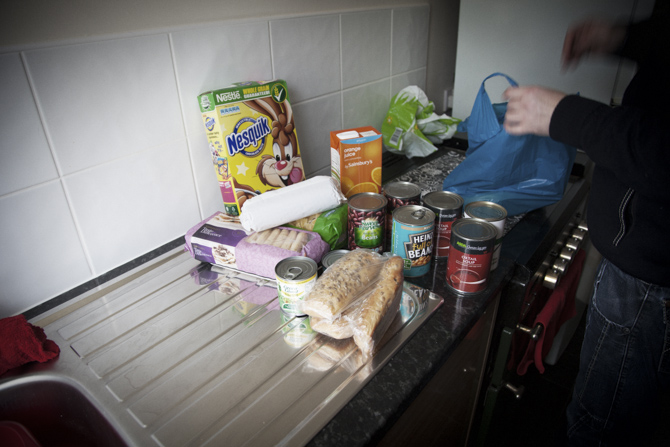
“Surely that won’t be enough,” I say, trying to imagine how these foodstuffs might be combined to make at least one meal a day for the next week. “Will you go hungry before next Monday?”
Lee nods.
“And what about the cereal? Have you got any milk to go with it?”
Lee opens his fridge, pulling out a half empty litre carton. “Sometimes you get long life milk but I’ve got this.”
“And what happens when that’s finished?” I ask.
He digs deep into one of his jeans pockets. “I’ve got £1.50 to buy some more,” he says. “And that’s it.”
Lee and I met for the first time just two hours ago. Monday is food parcel voucher morning at the UCAN and I was vaguely hoping I might find someone who I could accompany to pick up their supplies.
The UCAN staff all know Lee. They have supported him for some months now, most recently Rosanne has helped him apply for a citizen card – which the UCAN has paid for – so he’ll have the photo ID he needs for agency work. And for the past three weeks, they’ve given him vouchers for the food bank in town.
Up until November last year Lee had been working nights as an order picker at a fruit and veg warehouse. He enjoyed the work. One night he was ill, couldn’t get himself out of bed, and didn’t show up for work.
The next night he was still unwell and telephoned his boss. Apparently he’d already been replaced and his boss reported back to the Jobcentre that he had quit. In turn, the Jobcentre registered Lee as ‘voluntarily unemployed’ and has suspended his benefits for six months.
“It’s been getting me down, really down,” he says as Vanessa and I explain the idea behind the As Rare as Rubies blog, “I’ve been to the GP.”
“Come in tomorrow morning,” says Vanessa, knowing that today’s first concern is the food bank that opens just once a week. “We’ll make a list of priorities. It’s employment day and we can ask Cath to sit down with you. You’ve already spoken to Citizens Advice haven’t you?”
Pretty much every service the UCAN has to offer is relevant to Lee just now – employment advice, confidence-boosting, debt management, mental health support – and Vanessa is determined, as she now tells him, to get a team of professionals around him. But first, the food bank.
…. continued in The most generous






